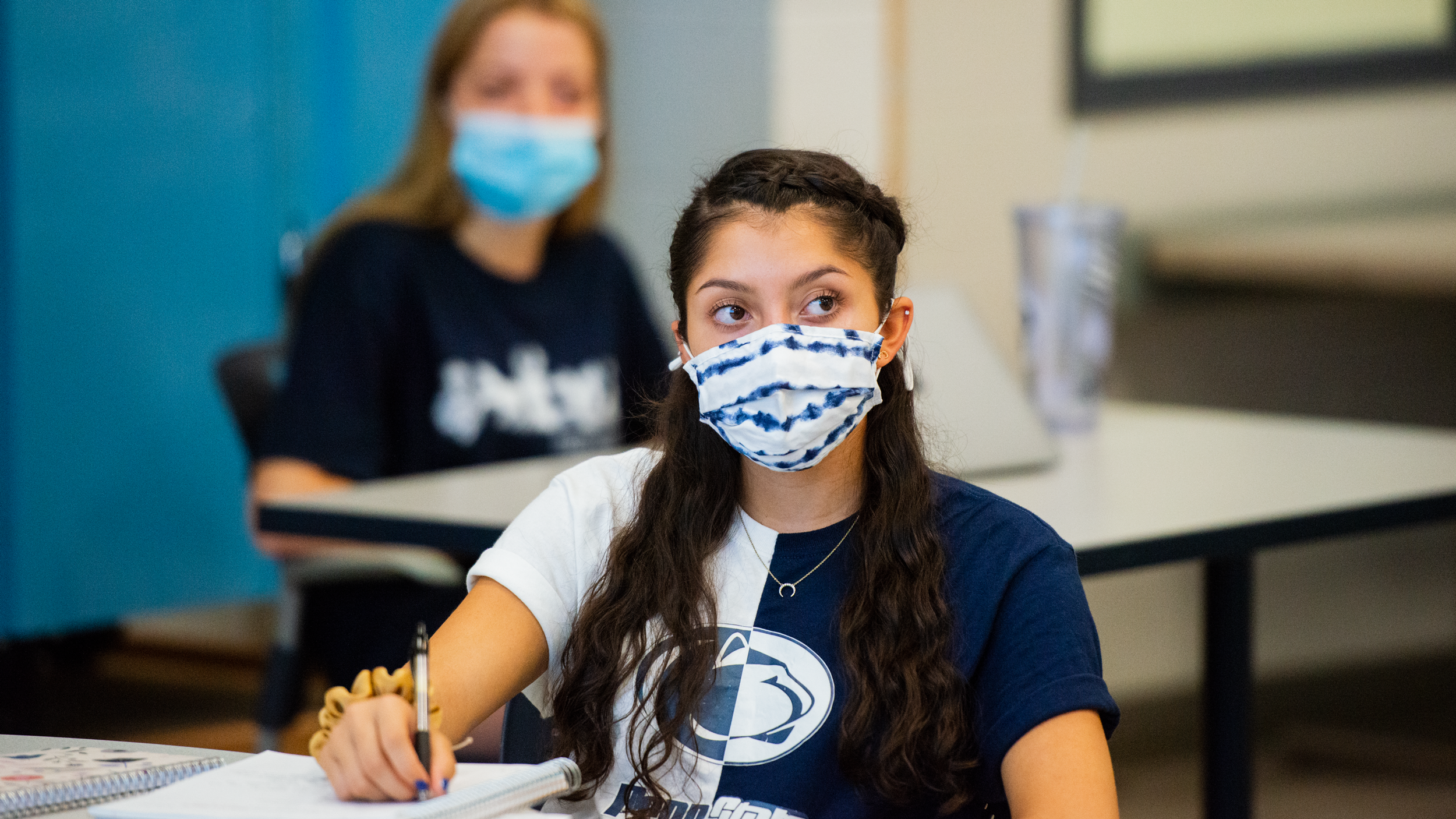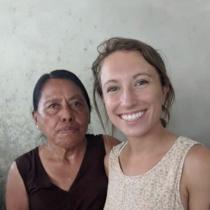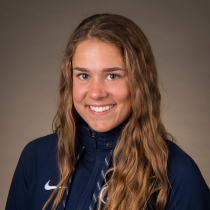Persevering amid the pandemic

Students, recent alumni, teaching faculty demonstrate grit and scholarship
From the swift switch to remote learning mid-spring, to the challenging decision as to whether or not to return to campus in the fall, the life of college students across the country since March 2020 has been nothing less than a ride.
Many BBH students have experienced the hardships of upheaval since the onset of the pandemic. Some students lost their part-time job when they left State College, whereas others found themselves without the needed course materials because, when they left for Spring Break, they left their textbooks and notes in their semester housing.

"When the pandemic struck in mid-March, I was living in Belize as a rural family health educator, rounding out my second year as a Peace Corps volunteer."
- Read about Caroline Kaschak's experience
-
For one alumnus, Caroline Kaschak (BBH major and Global Health minor, 2018), this upheaval meant not just moving home, but moving back to her home country from her Peace Corps assignment in Belize.
Kaschak was in a community helping to teach health in the schools as well as assisting in clinics with health and wellness education. The volunteers got the notice from the Peace Corps director over the Peace Corps website that all 7,000 worldwide volunteers were being sent home. Having no cases in Belize at the time, Kaschak felt anxious about having to pack up her life within two days and fly back and adjust to life in the United States.
When she got back, Kaschak used her time to finish up medical school prerequisites online and interview for CDC's Public Health Associate program which starts this October. She will be moving to Columbus to do disaster and preparedness work. Never a better time to get into public health work!

“As a contact tracer, I spoke with people every day about quarantine protocol, coronavirus symptoms, and isolation procedures. I am grateful for the unique insight I had into the public health efforts to mitigate the spread, and I am very proud that I contributed to the fight against COVID-19!"
- Read about Claire Swedberg's experience
-
Claire Swedberg, a BBH junior minoring in global health, decided to use her time over the summer to work in a newly-created field internship as a COVID-19 contract tracer for the Pennsylvania Department of Health. As a contact tracer, it was Swedberg's job to call people whom she had never met and inform them that they had been exposed.
Before Swedberg began making phone calls, she was terrified that her information would be poorly received. She was delivering some pretty bad news, after all. Every person on her list had been in close contact with a COVID-19 case and was required to quarantine for at least 14 days. Despite her nerves, nearly every phone call Swedberg made was greatly appreciated. She imagined that people would be furious when asked to quarantine, but that was not what happened.
One phone call in particular stands out in Swedberg's memory. She called a woman who is a grandmother and a breast cancer survivor to tell her that she had come in contact with someone who tested positive for COVID-19 and that she must quarantine for two weeks. The woman thanked Swedberg profusely for warning her of her exposure. She was so grateful to know, and her pleasant reaction to Swedberg's call made her feel incredibly proud.
Most conversations went smoothly, but there were individuals who were not happy to hear of their quarantine order. She spoke with a number of close contacts who were terrified to stay home from work for fear of losing their jobs or receiving an unlivable reduction in pay. Hearing the fear in their voices and listening to them wonder how they would feed their children was painful. It reminded Swedberg that the COVID-19 pandemic has turned the world upside down for so many families.
"The devastation of lost family members and the insecurity of unemployment is unfathomable," said Swedberg.
Tough choices for students
As the summer drew to an end, Penn State students were required to make yet another difficult decision: in what form would they take their fall classes? The University offered four options: in-person instruction, mixed-mode instruction, remote synchronous instruction, and remote asynchronous instruction. Two-thirds of BBH courses are being taught synchronously via Zoom in fall 2020; almost all of the remaining third have some degree of in-person learning (e.g., a required weekly lecture).
Being a student athlete, Swedberg decided to return to campus in the fall, where she is taking classes both in the classroom and online. She knew depending on any outbreaks she might need to return to her home in Chicago before semester’s end.
“As students and faculty transitioned into the fall semester, every day brought a new feeling of uncertainty,” Swedberg said. “Will I be sent home next week? Next month? I was constantly mentally preparing to pack my suitcase and drive right back to Chicago, where I spent my summer in the middle of a COVID-19 hotspot."
Swedberg thought that online classes sounded exciting at first. Instead of driving to campus at 8 a.m., she and her roommates sat together in their living room enjoying cups of coffee and lectures on separate screens. However, as the days and weeks crawled by, she began to miss the feeling of being packed into Thomas 100 or the Forum Building like a sardine. She longed to see the Starbucks line out the door at the HUB. And, yet, every time she set foot on campus she was reminded of how much her life had changed since March.
"I have only taken one exam in person this school year," Swedberg explained. "Nearly every exam, quiz, and assignment I complete is done on my computer. I miss collaborating with peers and discussing material with professors in the classroom. We have all made the best of virtual lectures, but they just aren’t the same."
Swedberg is also a member of the Penn State Softball team, so training sessions and practices were another reminder of the foreign world in which we are living. To this day, they have not opened the door to their locker room that was once filled with laughter and music before every single practice. They wear masks during training sessions and were banned from spending time with teammates outside of softball practice for the first half of the semester. Swedberg and her teammates get tested for COVID-19 every Wednesday morning, which is a luxury that many Americans would never dream of.
"I am confident, every Thursday or Friday, that I have avoided the virus for another week. It truly is a blessing."
Ultimately, attending classes on Zoom and in socially distanced lecture halls has made her realize how truly lucky she is to be a student at Penn State. Even virtually, her professors and TAs have put the mental health of their students first.
"They have been eternally kind and have made her truly understand the meaning of ‘WE ARE,’" Swedberg said. "I cannot wait for the day that they can be together again. Until then, I know we will keep learning together and supporting each other from afar because we are, and forever will be, Penn State."
As Swedberg’s story demonstrates, BBH students are indeed a resilient group. Challenges abound at present, but at the same time, so do opportunities for reflection and growth. Our current students are capitalizing on their opportunities to learn within and beyond their program. And, our BBH academic advisers even report that some students are preferring their online classes!

“The launch of the online BBH major in the fall of 2017 marked a significant milestone in advancing the University’s land grant mission of expanding the reach of higher education.”
- Read about Beth Edwards' experience
-
Recently, Beth Edwards reflected on her experience as an assistant teaching professor of the BBH World Campus program. The story of our online BBH majors is, similarly, one of dedication and grit.
“The launch of the online BBH major in the fall of 2017 marked a significant milestone in advancing the University’s land grant mission of expanding the reach of higher education,” Edwards said. “Even before the COVID-19 pandemic, BBH’s online major provided non-traditional students the opportunity to earn a degree in one of the University’s most popular programs."
Although there is no ‘typical’ BBH World Campus student, learners are overwhelmingly adults, full-time employees, and parents or caretakers. Many are also active duty service members or military spouses living and working around the world. Some are former residential students dealing with health issues that otherwise would have put their education on hold. Even though students in the online major were skilled in remote learning before the pandemic, they still faced significant challenges due to the outbreak.
While many BBH majors aspire to clinical careers, numerous BBH students in the online program are already working full-time in the health care field. Students working in healthcare found themselves balancing the rigors of their BBH courses while also taking on extra shifts and facing the risk of exposure to the coronavirus. For instance, Megan Zimmerman, a pediatric nurse, describes relying on humor to care for her patients and maintain the focus needed to succeed in her courses. Another World Campus BBH major, Erica McPeek, works full-time in mental health. Her experiences have spurred an interest in researching and evaluating policies that support mental health care workers’ own well-being, a topic she is investigating in her upper-level BBH courses.
The pandemic also created challenges for military students and spouses, especially those deployed overseas. Although internet and power outages are familiar inconveniences for our deployed service members, the addition of strict quarantine conditions in many countries created unprecedented barriers to accessing online coursework. Finally, BBH student parents have encountered tremendous challenges while pursuing their studies throughout the pandemic, frequently taking on the role of teacher for their own children while working full-time from home, without the benefit of childcare!
Despite the difficulties, students in the online major are persevering and even excelling as the number of BBH majors in the online program expected to graduate in the fall is on par or above pre-pandemic levels.
